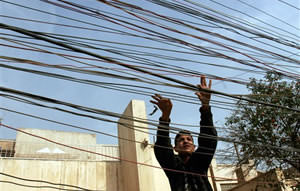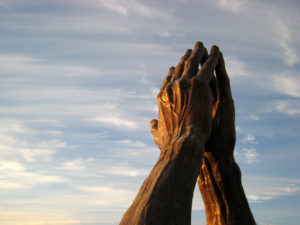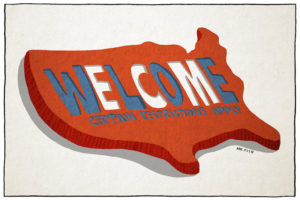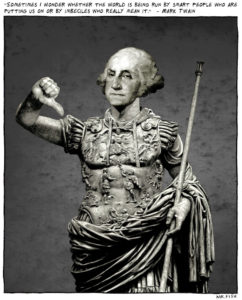Baghdad’s Other Power Struggle
As one U.S. soldier tells Truthdig foreign correspondent Anna Badkhen, it's not entirely a bad sign that residents of Baghdad's Saidiyah neighborhood are complaining about their meager daily power allotment: A year earlier they were concerned about just staying alive.
BAGHDAD — By the time American soldiers walked into Hadi al-Farji’s darkened home, a half-dozen people had complained to U.S. Army Lt. Rusty Mason about the lack of infrastructure in their neighborhood. Now Farji was going at it as well.
“The power supply is really bad,” said Farji, a judge who loves old Arabic poetry. “We barely get any power from the city, and the power we have from the generator is not enough to make even one refrigerator work.
“When the British colonized Iraq they built something — power lines, a railroad. What did the Americans build?” the judge persisted. “When Americans came here we hoped it would get better. But it’s been five years and we are still struggling.”
Mason, who arrived in Baghdad’s upscale Saidiyah neighborhood last fall, when streets here were ravaged by sectarian violence and abandoned by most of its residents, could barely contain his frustration.
“In Saidiyah, it’s easy to focus on the power because for the average person Saidiyah is safe. But there are parts of other neighborhoods that don’t have paved roads, let alone power,” said Mason, a platoon leader in Alpha Company of the 4-64 armor battalion of the Fourth Brigade, Third Infantry Division. The company has surrounded the neighborhood with a 12-foot concrete wall and set up checkpoints, effectively putting an end to the sectarian violence that raged here. “It seems that they don’t see all the things we do for them,” he said.
That Saidiyah residents can complain about power, Mason said, is a measure of success and “a sign of things being good in the community,” whereas less than a year ago Sunni and Shiite militias showered each other with submachine-gun fire and dead bodies sometimes lay unclaimed in the rubble-strewn streets for days.
But on the other hand, Mason acknowledged, the lack of basic services in this neighborhood exemplified how little has changed for the better since American troops invaded Iraq in 2003.
“It’s frustrating for me because I don’t really see much improvement as far as power goes since we’ve been here,” he said.
In fact, basic services all over Baghdad have improved little, if at all, in the last two years.
In 2006, Baghdad’s neighborhoods got power four hours a day — one hour on, six hours off. Many blocks have purchased generators to augment their electricity supply. Today, some parts of Saidiyah get power four hours a day, according to Lt. Col. Johnnie Johnson, the 4-64 battalion commander, but Farji’s street had not received any electricity through the city’s power supply in the last two weeks. Residents there rely entirely on privately owned generators, which transmit power on no particular schedule two or three hours a day and charge about $12 per ampere. A typical family, with an average monthly income of about $400 a month, spends about $65 each month on electricity.
“Yesterday was a good day: The power came on for two hours in the afternoon, then for an hour in the evening, and for 15 minutes at 4 a.m.,” said Basem as-Zuwaidi, a chemical engineer who works for the Ministry of Industry. “Sometimes we only get one hour of power.”
The water supply is equally inconsistent. Baghdad residents use electric pumps to draw water from the city supply. In some areas on Baghdad’s outskirts people have no running water at all, Johnson said.
Trash pickup, which stopped shortly after the war began, is irregular or nonexistent, and varies from one neighborhood to the next. In Saidiyah, garbage collection is more or less steady, but still not robust enough to remove discarded soda cans, rotting food, empty paint containers, plastic bags and scraps of paper and cardboard that line some streets. A block away from Judge Farji’s house, a car mangled by a roadside bomb sits on the curb, an unintentional monument to the neighborhood’s violent past.
In other parts of the city, where no one regularly collects the trash, people are using the yards and rooftops of their neighbors’ abandoned houses as impromptu landfills. Plastic bags get stuck in sewage pipes, clogging them and causing waste to spill into city streets in putrid pools of green. In some parts of the city, the pools have been stagnant for years.
Johnson accuses Sunni and Shiite militias, which target garbage collectors because they work for the Iraqi government, of sabotaging trash pickup.
“If you have contractors hired to clean the road, and if they are threatened to not come back here, it’s hard for us to get someone to come back to work,” said Johnson.
Saidiyah residents acknowledge that, compared to the devastation that sectarian warfare wrought here a year ago, the neighborhood has improved significantly, even though occasional gunshots still puncture the air at night.
But they are impatient to see improvements in their lifestyle and miss the relative luxury of prewar times, when the area got power and water almost round the clock. They see the current Iraqi government as largely powerless to improve their lives, and complain about contractors who are corrupt or incompetent.
Last week, for example, a contractor hired to upgrade decrepit power lines in one section of Saidiyah started digging for cables and punctured the pipe supplying water to the area, said Ali al-Ameri, the chairman of the Saidiyah neighborhood council, which has been trying to improve life and infrastructure in the area for months.
“I think fixing these problems is very simple,” said Faras al-Qabi, the secretary of the council. “All you need to do is to give money to contractors who won’t steal. To tell you the truth, many of them do [steal],” he said. “Not all of them, but many of them.”
Johnson, who attends most of the neighborhood council’s meetings, said he is used to hearing Iraqis complain about poor infrastructure, and considers it a sign of their trust in what they see as the Americans’ ability to make things work.
“Because the government has been not as effective as it should be, we represent progress,” Johnson said. “If they want something done quickly, they ask us. Unfortunately, the power supply is not up to me. The entire country is like this, and the Iraqi government has to fix it.”
Anna Badkhen has returned to Iraq for the 10th time since 2003. She has covered wars in Iraq, Afghanistan, Somalia, Israel and the Palestinian territories, Chechnya and Kashmir. Her previous trip to Iraq was in 2006. Read more in her Baghdad journal on The Muckraker.
Your support matters…Independent journalism is under threat and overshadowed by heavily funded mainstream media.
You can help level the playing field. Become a member.
Your tax-deductible contribution keeps us digging beneath the headlines to give you thought-provoking, investigative reporting and analysis that unearths what's really happening- without compromise.
Give today to support our courageous, independent journalists.





You need to be a supporter to comment.
There are currently no responses to this article.
Be the first to respond.